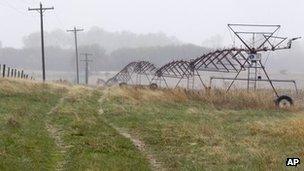Keystone XL: TransCanada submits new route for review
- Published

Environmental groups oppose the pipeline, saying a spill could contaminate water
The Canadian firm trying to build an oil pipeline from Alberta to the US Gulf Coast has formally proposed a new route, the US state department says.
The route from the US-Canada border to Steele City, Nebraska is expected to avoid environmentally sensitive land.
The White House previously put the plan on hold, saying it needed more time to assess the environmental impact of the $7bn (£4.3bn) Keystone XL pipeline.
But opponents said it would create jobs and reduce dependence on foreign oil.
The fate of the oil pipeline has been debated as petrol prices have risen - an issue that Republicans are attempting use to attack President Barack Obama during an election year.
But correspondents say the new application by pipeline firm TransCanada could dampen criticism of the Obama administration's initial rejection.
The new plan includes new routes through the state of Nebraska, where environmentalists had complained of possible damage to a major aquifer.
Alternative routes
"The multi-billion dollar Keystone XL pipeline project will reduce the United States' dependence on foreign oil and support job growth by putting thousands of Americans to work," said Russ Girling, president and chief executive officer of TransCanada.
Republicans in the US Congress have strongly backed the Keystone XL project, regularly criticising the president for blocking the previous route and attempting to link approval of the route to a succession of unrelated legislative bills.
The state department itself has estimated that approval the project could create up to 6,000 jobs.
But environmental groups and some Democrats have opposed the pipeline project, saying it would transport oil extracted from tar sands and raises the risk of a spill.
TransCanada has now amended its plans and the route is expected to bypass the Sand Hills region of Nebraska, which has an aquifer on which eight states rely for farming and drinking water.
The state department has not said how long the review process, which includes an assessment of the environmental impact as well as whether the project is in the national interest, might take.
But it said the review would be "rigorous, transparent and thorough", the AFP news agency reported.
"Nebraska has stated that their own review of the new route will take six to nine months," the department said in a statement.
"Previously when we announced review of alternate routes through Nebraska... our best estimate on when we would complete the national interest determination was the first quarter of 2013."
It added that existing analysis would be used to speed the new review, and would begin by hiring an external contractor to assist with it.
In February, the president approved construction on the southern part of the pipeline route. Construction could begin as early as June.
- Published19 January 2012